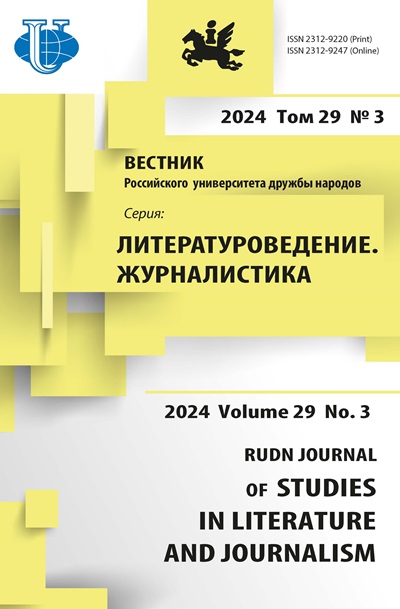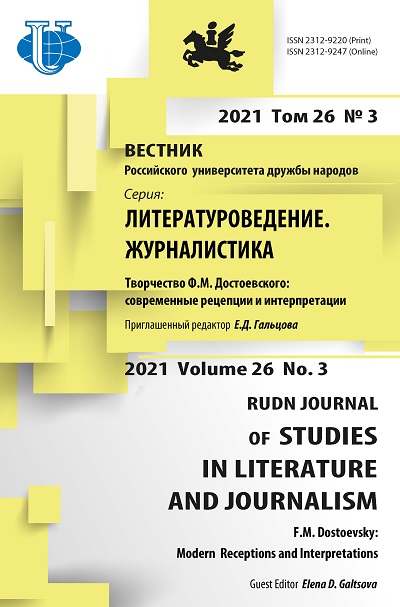Notes from Underground by F.M. Dostoevsky in XXth Century English Criticism
- Authors: Markova E.A.1,2
-
Affiliations:
- A.M. Gorky Institute of World Literature of the Russian Academy of Sciences
- Peoples’ Friendship University of Russia
- Issue: Vol 26, No 3 (2021): F.M. DOSTOEVSKY: MODERN RECEPTIONS AND INTERPRETATIONS
- Pages: 479-489
- Section: LITERARY CRITICISM
- URL: https://journals.rudn.ru/literary-criticism/article/view/27649
- DOI: https://doi.org/10.22363/2312-9220-2021-26-3-479-489
Cite item
Full Text
Abstract
The article is devoted to the issue of the critical reception of F.M. Dostoevsky’s Notes from Underground in the XXth century. Some letters, as well as books on philosophy and literary criticism by such writers as D.H. Lawrence, J.M. Murry, C. Wilson and I. Murdoch are analysed. The reviews by the given authors correspond to two waves of interest in Dostoevsky - the first one took place at the turn of the XXth century followed by the second one in the middle of the century. The writers name the key characteristics of the Underground Man: vanity, egoism, self-division, desire for suffering and inability to act. Some critics of Dostoevsky’s Notes see the Underground Man as recurrent image and note his relevance to the ideas of existentialism, especially the one about inability to apprehend truth in a rational way.
About the authors
Ekaterina A. Markova
A.M. Gorky Institute of World Literature of the Russian Academy of Sciences; Peoples’ Friendship University of Russia
Author for correspondence.
Email: glazkova1992@gmail.com
ORCID iD: 0000-0001-5954-1440
PhD, Senior Researcher
25a Povarskaya St, 121069, Moscow, Russian Federation; 10/2 Miklukho-Maklaya St, Moscow, 117198, Russian FederationReferences
- Muchnic, H. (1939). Dostoevsky’s English Reputation (1881–1936). Northampton (MA): Smith College Publ.
- Lawrence, D.H. (1970). The Quest for Rananim. D.H. Lawrence’s Letters to S.S. Koteliansky 1914 to 1930. G.J. Zyataruk (Ed.). London: McGill – Queen’s UP.
- Lawrence, D.H. (1979). Letter to Gordon Campbell, 20 December 1914. In The Letters of D.H. Lawrence (Vol. 2, pp. 246–250). Cambridge: CUP.
- Shestov, L. (1993). In Job’s Balances. L. Shestov. In Collected works (Vol. 2, pp. 25–402). Moscow: Nauka. (In Russ.).
- Kaye, P. (1999) Dostoevsky and English Modernism 1900–1930. Cambridge: CUP.
- Murry, J.M. (1966). Fyodor Dostoevsky. A Critical Study. New York: Russel & Russel.
- Dostoevskij, F.М. (1973). Notes from Underground. In Collected works (Vol. 5, pp. 133–245). Leningrad: Nauka. (In Russ.).
- Dostoevskij, F.М. (1982). The Writer’s Diary 1876. November–December. In Collected works (Vol. 24). Leningrad: Nauka. (In Russ.).
- Kaufmann, W.A. (1956). Existentialism from Dostoevsky to Sartre. New York: Meridian Books.
- Wilson, C. (1956). The Outsider. Boston (MA): Houghton Mifflin.
- Dostoevskij, F.М. (1976). Preparatory Materials. Notes, Plans, Drafts. January–November 1875. In Collected works. (Vol. 16, pp. 252–439). Leningrad: Nauka. (In Russ.).
- Murdoch, I. (1971). The Sovereignty of Good. New York: Schocken Books.
- Murdoch, I. (1999). The Fire and the Sun: why Plato banished the artists. In Existentialists and Mystics: Writings on Philosophy and Literature (pp. 386–463). New York: Penguin Books.
- Cropp, M., Hargreaves, Lee K., Sansone, D. (2000). Euripides and Tragic Theatre in the Late Fifth Century. Champaign (IL): Stipes Pub. LLC.
- Rehm, R. (2020). The Play of Space: Spatial Transformation in Greek Tragedy. Princeton (NJ): PUP.
















